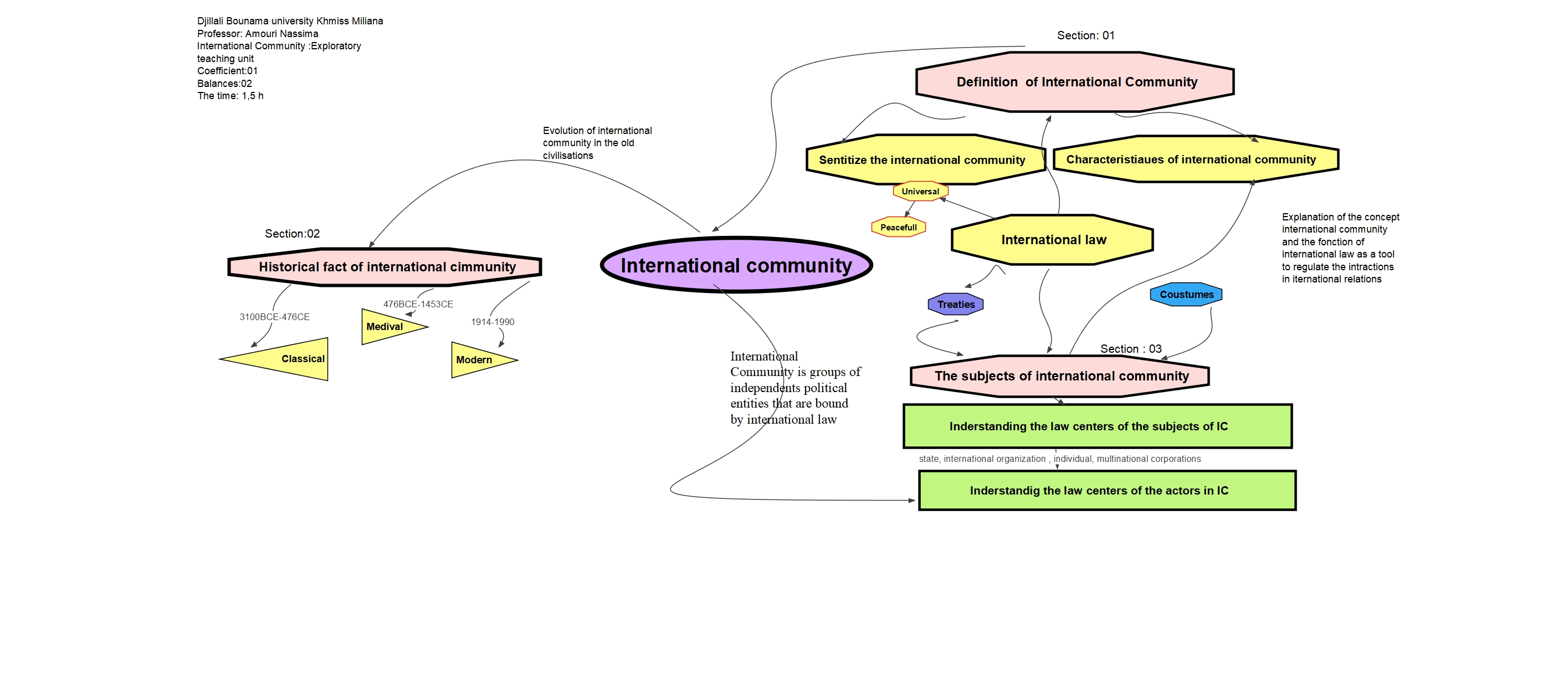المجتمع الدولي
Section outline
-
Professor of the module: Amouri Nassima
The International Community: Exploratory Teaching Unit
First year of Bachelor's degree in Legal and Administrative Sciences
coefficient : 01
Balances: 02
The time: an hour and a half.
Introduction :
The International Community scale, from a legal studies perspective during this semester, addresses the nation-state as a fundamental nucleus for shaping the international community after the Treaty of Westphalia in 1684. This treaty worked on regulating and organizing the relations between states according to the frameworks established by international law.
Objectives of studying the International Community scale:
We also covered the historical evolutionary path of the international community from ancient times to the medieval period, up to the contemporary era. The United Nations was established, and after that, the international community underwent unprecedented developments. The world witnessed the decolonization of nations, the emergence of multinational corporations, and the establishment of hundreds of regional and international organizations. The United Nations was able to play a significant positive role in the emergence of new states by supporting their independence, making the international community a global and more organized society than ever before. Finally, we provided an explanation to understand the legal status of individuals in the international community, as well as the active entities in the international community.
During these semester we will study 03 sections:
section 01: Definition of international community
- explqntion of international community.
- Characteristiques of international community.
- The internationl law.
section 02: Historical development of international community
- The International Community in the Ancient Era.
- The International Community in the Medieval Era.
- The International Community in the contemporary era.
section 03: The subjects of international community
-Inderstanding the law centers of the subjects of international community.
- Inderstanding the law centers of the actores of international community.


-
What are the main components of the international community?
What is your evaluation of the role of the Islamic State in enriching international law and organizing the international community?
-
-
The characteristics of the international community are highlighted in terms of the management of relations between persons of the international community, We conclude that the international community has the following characteristics:
Formative Property, Universal property, Enjoyment of the rights, Anarchical Society
-
-
-
The purpose of international law is to provide a framework and a set of rules that govern the conduct and relations of sovereign states and other international actors in the global arena, international law is a set of legal rules that find their source in international agreements, international custom and general principles of law, where these rules are applied to the subjects of international law in regulating their relations and determining rights and duties.

-
-
-
International law in ancient times was characterized by being reactive, and this can be attributed to two fundamental factors:
1. Ancient societies lived in isolation, hindering economic, intellectual, and cultural exchange, which impacted the development of international relations.
2. The significant differences in religion, language, and identity among ancient societies led to strained relations between civilizations, often evolving into conflicts.

-
-
-
ü The Islamic society during the medieval era had interconnected relationships with various other societies. It granted rights to non-Muslim communities, acknowledging their existence. This indicates that Islamic law is applicable to all peoples and nations, regardless of time and place.
ü During the medieval period, European society saw a division in international law between the laws of war and the laws of peace. The concept of just and unjust war emerged, distinguishing between legitimate and illegitimate warfare. Additionally, there were efforts to introduce peaceful methods for resolving conflicts, such as arbitration and mediation. These developments reflected a growing awareness of the need for legal frameworks to regulate both armed conflict and peaceful relations between states.

-
-
Contemporary international society is characterized by a complex and interconnected global landscape that is shaped by various political, economic, social, and technological factors, It's essential to note that the state of international society is fluid and subject to change based on geopolitical events, economic shifts, and societal developments. For the latest information, consider checking more recent sources or news updates.
-
The international law focuses on the state from the perspective of its role in the international community.
International Organizations contribute to the development, implementation, and enforcement of international law in various fields, ranging from security and economics to human rights and the environment.

-
Political and civil rights of individuals do not fall within the scope of international law, but they are limited to the natural and fundamental rights of humans. However, positive international law denies that individuals are international.
In international law, multinational corporations (MNCs) are considered commercial entities that operate in more than one country. There are legal issues related to multinational corporations.



